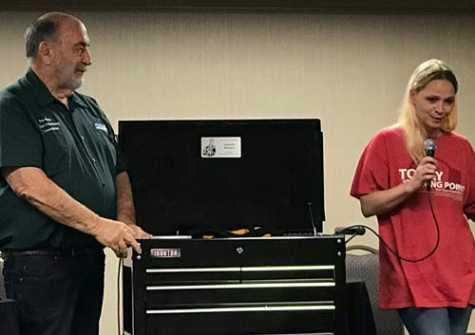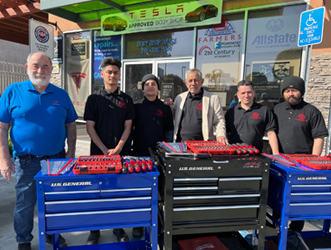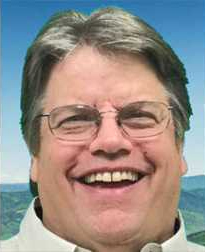Samantha McCauley, a collision repair refinish instructor at Hammond High School in Hammond, IN, said it can be very challenging to acquire the proper tools and equipment needed in her classroom to properly instruct students.
“There are a lot of times that I request equipment and I’m sure other teachers across the country are in the same predicament,” she said. “Our administration says to put our requisition forms in; every week for months, we follow up to find out what happened to the requisition forms only to find out the funds are already gone.”
McCauley recently received a special gift to help alleviate that frustration.
During the Collision Industry Conference (CIC) in Indianapolis, Toby Chess presented McCauley with two toolboxes, one for her own needs and the other for her students to use. The toolboxes were awarded on behalf of the March Taylor Scholarship Fund.
“I truly appreciate what you are doing and so will the students,” said McCauley.
She encouraged CIC attendees and the industry to get involved with students as much as possible—whether that’s speaking to them about the collision repair trade or offering tours—and show them the possibilities available.
“Right now, everyone in the industry recognizes the need to draw more students into the collision repair field,” said Chess. “We need more young men and women. The question is: ‘How do you attract them?’”
Through his work in the collision repair industry and with the March Taylor Memorial Fund, Chess has found a way to support the industry and reach students who will potentially fill the jobs of the future.
“The biggest problem is when you are getting an entry-level technician coming into your shop and they don’t have tools,” said Chess.
To help address this challenge, Chess has reached out to tool and equipment companies across the country as well as body shops requesting monetary and in-kind donations. The donations are then used to purchase tools and toolboxes for collision repair students and teachers. In addition to the two McCauley received, six individuals were awarded toolboxes at the June CIC in Nashville, TN, on behalf of the March Taylor Memorial Fund.
Many in the industry are familiar with the name March Taylor, who lived and worked in the collision repair industry. He was known for living his life according to the Hawaiian word “Kina’ole,” which means “Doing the right thing in the right way, at the right time, in the right place, to the right person, for the right reason, with the right feeling … the first time.”
Chess said Taylor was a compassionate businessman who was committed to changing the collision repair industry for the better and helping people learn.
When Taylor passed away 12 years ago, the March Taylor Memorial Fund was established in his name to benefit collision repair technicians. Today, Chess said the donations received by the industry are used to provide the next generation of technicians a “step upward” through tool scholarships and mentoring opportunities.
With a reputation for being a hard worker, Taylor would often start his day early and work after-hours and weekends. Rather than doing it for recognition, Chess said he did it because it was the “right thing to do.”
“March only gave,” said Chess. “He never took a thing from the industry.”
“The March Taylor Memorial Fund was started by those of us who knew and loved March and believed in his passion for the collision industry and the technicians who made it all possible,” said Barry Dorn, owner of Dorn’s Body and Paint in Mechanicsville, VA. “March was always about helping new technicians get into the industry.”
Dorn is a member of the March Taylor Memorial Fund committee along with Jeff Hendler, CIC administrator; Jordan Hendler, president of Admin Concepts; Dale Matsumoto, president of Auto Body Hawaii; and Chess.
They have found that a wide cross-section of the collision repair industry has shown its support by making donations that will help provide opportunities for students, technicians and teachers, like McCauley, while honoring March Taylor’s memory.
“I strive to teach every young individual who steps into my classroom the same skills and trades I have myself, always maintaining a strong level of compassion, integrity and perseverance,” McCauley wrote in her application when applying for a grant. “My integrity gives me the determination to take on the tougher assignment and handle them honestly while perseverance—most important of all—is needed in the public education system to encourage myself and those around me to not only do the best quality work, but also to do it when we’re under strenuous conditions.”
“She’s a champion for her students,” said Jeff Hendler during the CIC presentation.
He said helping technicians further their careers through scholarships and tools speaks to the heart of the March Taylor Memorial Fund.
“March would be smiling as he always kept his focus on assisting those in the workshop repairing cars,” he said.
In addition to the toolboxes, the March Taylor Memorial Fund also offers collision repair technician grants that include I-CAR coupons, partial or full payment for industry training or the ability to attend industry events. An application is available online and can be submitted throughout the year. Dorn said scholarships have been awarded at the Collision Industry Conference (CIC) and at the Society of Collision Repair Specialists (SCRS) Red Carpet Awards breakfast at the SEMA show in Las Vegas.
To apply for a grant, Chess said individuals must have worked in collision repair for at least two years, currently be employed in the industry and their employer must be part of a collision industry association, whether it’s local, state or national.
Chess recalls a recent high school graduate who had aspirations to attend a vocational-technical school, on the recommendation of a teacher, but he had some financial hardships and took out a loan to follow his career path. He also applied for assistance through the March Taylor Scholarship Fund and received $2,000 toward his education.
“The Memorial Fund will always maintain March’s focus,” said Hendler. “The donations allow us to do that.”
“We hope the entire industry gets involved,” said Chess. “We wanted to do something proactive to encourage these individuals to join the profession instead of just sitting back.”
For more information about the March Taylor Memorial Fund and to donate, visit: https://www.marchtaylormemorial.org/.














Stacey Phillips Ronak